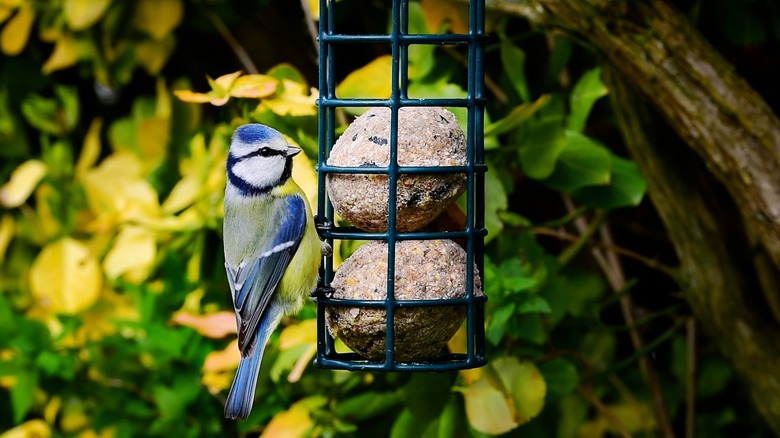The Vinegar Trick You Should Be Using To Clean Your Suet Bird Feeder
During the fall and winter months, suet offers a great way to keep birds at your feeders longer while providing nourishment when other sources of food like berries and nuts are scarce. Cleaning the feeder before adding a new DIY suet block or balls can keep oily residue at bay. This is important because when it gets on a bird's feathers, oil can lead to fatal hypothermia in the winter. However, using equal parts of white vinegar and water and a gentle scrubber will help disinfect your cage feeder as you get it ready to refill.
When the warmer months of the year roll around (or an occasional warmer than usual day or two during the winter), DIY suet can quickly turn into a sticky mess as it melts. Since all that goop can cause a bird to preen endlessly when it sticks to their feathers, they may die of starvation instead of foraging for food. Suet can also become rancid when left out in the heat. That's why many people take their cage feeders down, clean them, and store them away until there's a chill in the air again. And yes, you can use white vinegar to help clean your suet feeder in this instance, too.
How to clean your suet feeder with a vinegar solution
If you're going to keep a cage feeder and fill it with a DIY suet block to feed your outdoor bird friends, proper maintenance is the key to keeping all your feathered visitors healthy. "Keeping feeders clean is an important element of bird feeding. Wire cage feeders for serving suet get very messy, so they need regular cleaning, more often in hot weather," as noted by bird experts Kenn and Kimberly Kaufman in Birds & Blooms. "Start by soaking the empty feeder in warm water mixed with mild dish detergent and a little vinegar. After it has soaked for an hour or two, wipe off any accumulated gunk with a soft brush or a sponge. Rinse the feeder thoroughly before you refill it and put it back out for the birds."
Audubon New York suggests cleaning all types of bird feeders in one part white vinegar to one part water, in fact. So, it's indeed safe to add vinegar to the list of natural ingredients you should use to clean your grimy suet cage, whether you're doing it routinely during the winter or stowing it away during the hotter parts of the year. If you don't have white vinegar, the same method, but with apple cider vinegar, will also work.


